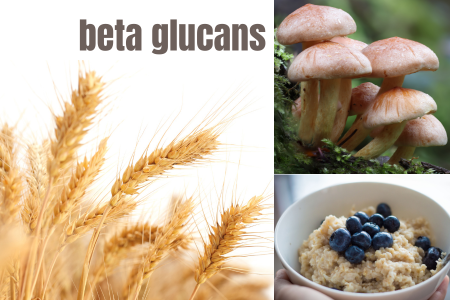
When you purchase linked products presented on this page, Supplement Sciences, LLC receives affiliate fees so that our dietitians can continue to create great content.
Thank you for your support!
Beta-glucan supplements have been gaining recognition for their wide-ranging potential benefits. Found naturally in various sources such as oats, barley, yeast, and certain types of fungi and bacteria, beta-glucans are a type of dietary fiber known for their immune-boosting and heart health benefits. These powerful polysaccharides have caught the interest of researchers due to their role in managing conditions from high cholesterol to covid and even cancer.
If beta-glucan supplements are right for you, this article will show you the best place to order beta-glucan online. Supplement Sciences has partnered with Fullscript’s professional-grade supplement formulary to provide a 20% discount on every order, so you always have access to the highest quality supplements at the best prices. This article dives deep into the science behind these claims, exploring how beta-glucan supplements can be a valuable addition to your health regimen, and guiding you through the latest research on their potential benefits and applications.
What Is Beta-Glucan?
Beta-glucan is a group of soluble dietary fibers that are found in whole grains such as oats and barley, certain types of mushrooms, yeast, and seaweed. As a polysaccharide sugar, Beta-glucans are distinguished by their beta-glycosidic linkage structure that the human body recognizes and interacts with.
Beta-glucan
A String of Glucose Units With Different Branch Points.
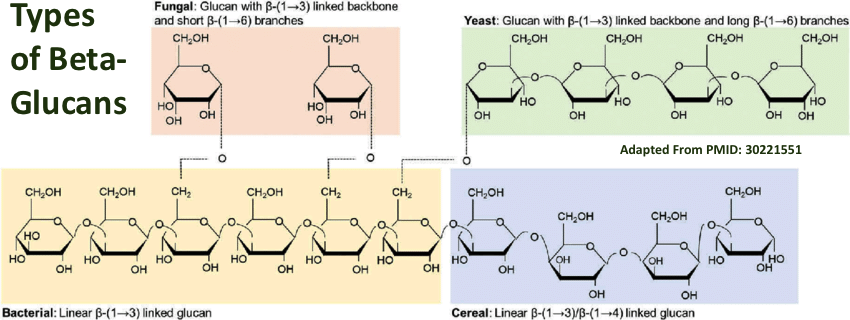
It is a complex carbohydrate composed of glucose molecules arranged in a distinct pattern with beta-type linkages, making it stand out among other carbohydrates. This potent compound is abundantly found in various natural sources, with fungi (such as Shiitake and Reishi mushrooms) and certain grains (like oats and barley) being the most notable providers. When consumed, beta glucan interacts with specific receptors on immune cells, triggering a cascade of responses that enhance the immune system’s vigilance and effectiveness in combating infections and illnesses.
Beyond its immune-boosting capabilities, beta-glucan also shows promise in supporting heart health. Research suggests that regular intake of beta-glucan can lower cholesterol levels, particularly LDL cholesterol, often known as “bad cholesterol.” By forming a gel-like substance in the digestive tract, beta-glucan interferes with cholesterol absorption, potentially reducing the risk of heart disease. Additionally, the compound displays antioxidant and anti-inflammatory properties, further contributing to its potential in protecting cells from oxidative stress and chronic diseases like cancer and neurodegenerative conditions. As a natural powerhouse with a range of health benefits, incorporating beta glucan-rich foods or supplements into a balanced diet could be a promising step towards improving overall well-being.
What are the Health Benefits of Beta-Glucans?
- Heart Health: Beta-glucan, especially from sources like oats and barley, can help lower LDL (“bad”) cholesterol levels, contributing to improved cardiovascular health. [PMC2663451]
- Reduces Cancer Risk and Helps In Cancer Treatment: Beta-glucans are able to reduce the risk of cancer by enhancing the body’s immune response, which helps in detecting and eliminating cancerous cells more effectively. [PMC7016572]
- Supports Immune System: Beta-glucan can help boost your immune system, especially those derived from yeast and mushrooms. It helps your body to fight off infections and diseases more effectively. [PMC3236515]
- Digestive Health: Being a type of fiber, beta-glucan aids in maintaining a healthy digestive system. It helps promote regular bowel movements and contributes to good gut health. [PMID: 34709792]
- Blood Sugar Control: Beta-glucan can slow down food digestion, which results in a more gradual rise in blood sugar levels after meals. This property can be particularly beneficial for people with diabetes. [PMC2663451]
- Weight Management: Beta-glucan may aid in weight control by creating a feeling of fullness, which can discourage overeating.[PMC3236515]
- Covid-19 Immune Therapy: Certain extracts from the Shiitake mushroom can help calm down our body’s overactive immune response, which can cause severe lung damage in coronavirus pneumonia. Different extracts work differently, but they all show promise in helping to prevent the harmful effects seen in severe COVID-19 cases. [PMC7211630]
Types of Beta-Glucans
Not all beta-glucans are the same. They come in different types with unique molecular linkages, each offering distinct health benefits. Understanding these linkages can shed light on the range of health advantages offered by each type of beta-glucan. The three primary types are 1,3 beta glucan, 1,6 beta-glucan, and 1,4 beta-glucan.
Beta-1,3 / 1,6-Glucan: Immunomodulation
Beta-1,3/1,6-glucan is a prominent type of beta-glucan found primarily in the cell walls of bacteria and fungi, with the number referring to the specific bonding pattern between the glucose units in the polymer. Health benefits associated with this type of beta-glucan include its potent immunomodulatory effects, where it helps boost the immune system’s response to infections and diseases. The 1,3-1,6-beta-glucans are considered to be the best biological response modifiers and have immunogenic properties [PMC7188827]
Some primary food sources of Beta-1,3/1,6-glucan include baker’s yeast, shiitake mushrooms, and some types of seaweed. From a chemical standpoint, the structure of beta-1,3/1,6-glucan consists of a backbone of glucose residues linked by β-1,3-glycosidic bonds, with branches connected by β-1,6 linkages, thus the moniker Beta-1,3/1,6-glucan.
Beta-1,3 / 1,4-Glucan: Blood Sugar, Cholesterol, and Gut Health
Another significant type is the Beta-1,3 /1,4-glucan, which is prevalent in plants, especially in cereal grains like oats and barley. It’s associated with health benefits, including reducing cholesterol levels, controlling blood sugar, and supporting gut health due to its high dietary fiber content.
Oats and barley are the primary food sources of Beta-1,3/1,4-glucan, but it can also be found in other whole grains such as wheat and rye. In terms of its chemical structure, Beta-1,3/1,4-glucan consists of glucose monomers linked by β-1,4 bonds in the main chain and β-1,3 bonds at the branching points, making it a unique complex carbohydrate.
Beta-1,4-Glucan: Gut Health
Beta-1,4-glucan, otherwise known as cellulose, is the most common organic compound and the primary structural component in the plant kingdom. This type of beta-glucan forms the structural integrity of plant cells. Humans lack the necessary enzymes to digest it; however, it provides dietary fiber that promotes digestive health.
Primary sources include all plant-based foods, with significant amounts in vegetables, fruits, whole grains, and legumes. The chemical structure of Beta-1,4-glucan is straightforward, with glucose units joined solely by β-1,4-glycosidic linkages, which gives cellulose its high tensile strength.
As you can see, beta-glucans are a diverse group of polysaccharides with different types of linkages that offer unique health benefits. From immune-boosting and immune-modulating effects to cholesterol reduction, these natural compounds play a vital role in supporting overall well-being.
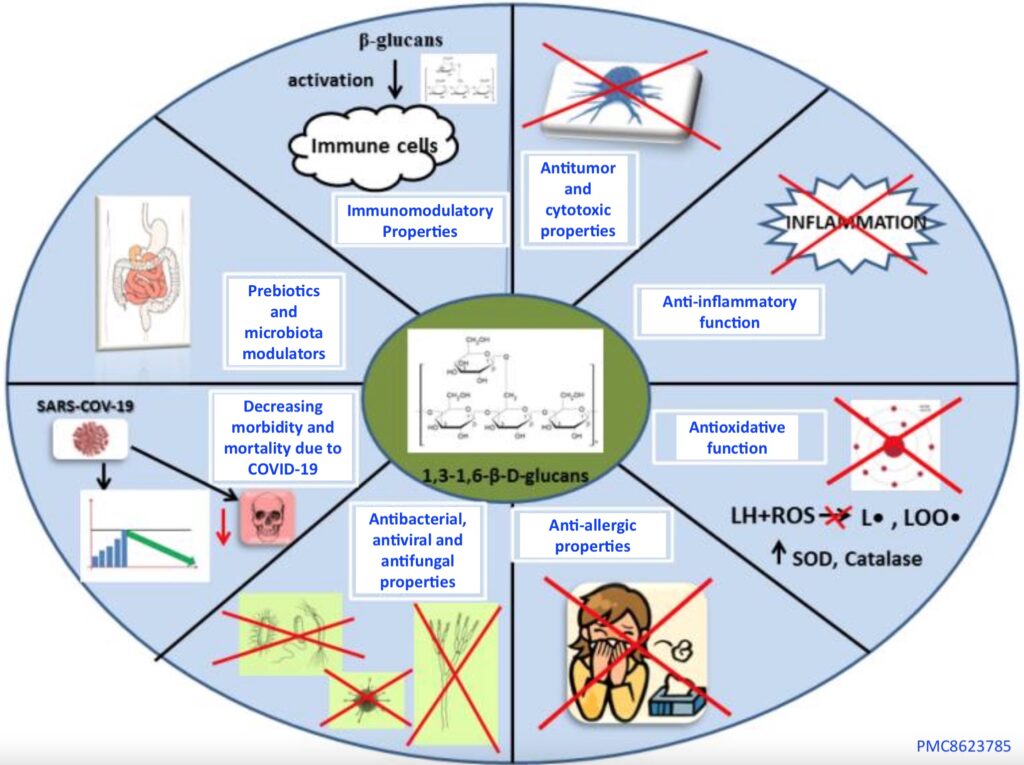
Beta Glucan And Chronic Inflammatory Response Syndrome (CIRS)
What is CIRS?
Mold Illness and Lyme disease are the top 2 causes of CIRS. Chronic Inflammatory Response Syndrome (CIRS), also known as biotoxin illness, is a multi-system, multi-symptom condition triggered by exposure to certain biological toxins. Often these toxins originate from molds found in water-damaged buildings, but they can also come from tick-borne illnesses, spider bites, or certain types of fish consumption.
CIRS happens when the immune system fails to “turn off” after the initial threat is gone. This leads to prolonged inflammation that can affect nearly every system in the body. Common symptoms can include fatigue, memory problems, joint and muscle pain, difficulty concentrating, gastrointestinal issues, and more. It’s a complex illness that often requires a multifaceted treatment approach and can be hard to diagnose due to its wide array of symptoms.
How Does Beta Glucan Help CIRS?
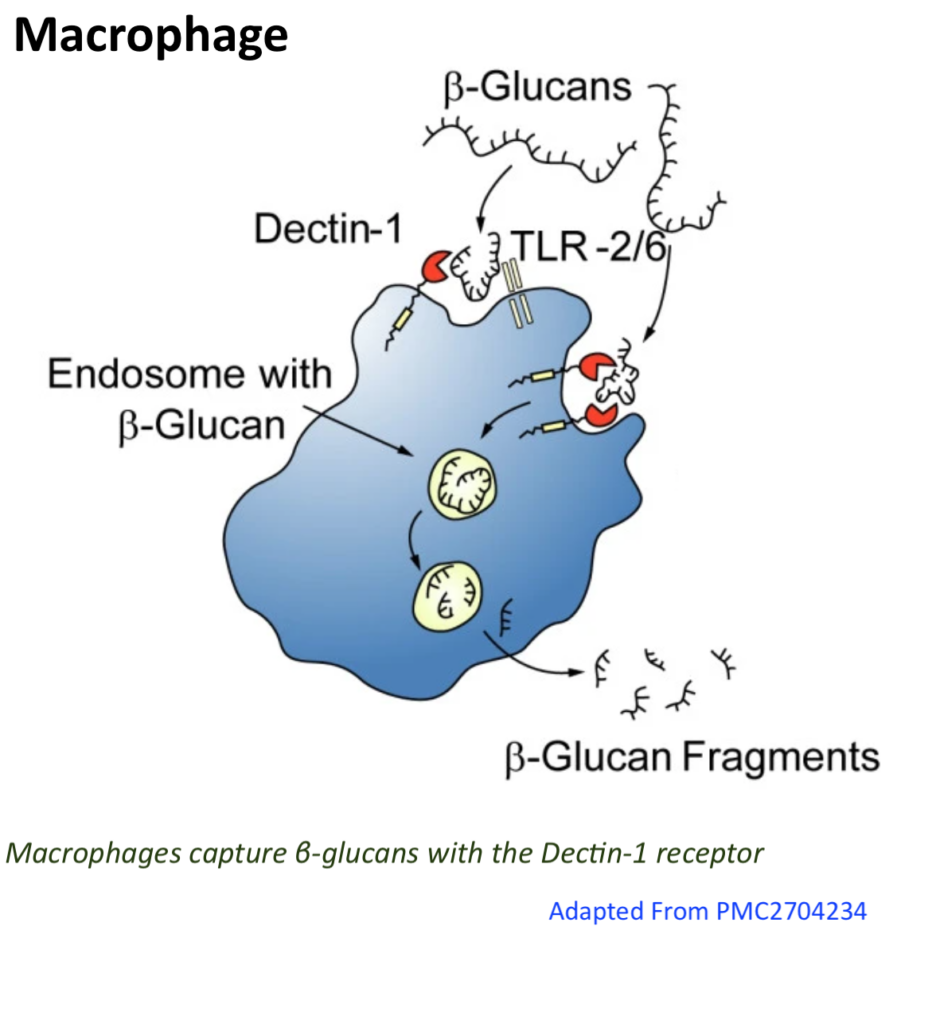
CIRS is primarily an issue of a dysregulated immune system, where the body remains in a state of chronic inflammation long after being exposed to a triggering biotoxin. Beta-glucans is thought to help by essentially ‘re-training’ the immune system. They do this by interacting with certain immune cells, like macrophages and dendritic cells, and stimulating them to respond in a more controlled, appropriate way.
Specifically, beta-glucans bind to a receptor on these cells called Dectin-1. This binding process initiates a cascade of events within the immune cell that triggers a more balanced immune response, including the activation of immune modulators. In essence, beta-glucans might help ‘reset’ the immune response to be less hyperactive and more measured, which could help reduce the chronic inflammation seen in CIRS.
Beta Glucans could be a significant player in managing Chronic Inflammatory Response Syndrome (CIRS), a condition caused by exposure to biotoxins from certain molds. This syndrome can cause a variety of symptoms due to a constant inflammatory response in those who are susceptible.
An essential part of our immune system’s defense against fungal infections, including those associated with CIRS, are Dectin-1 receptors. These receptors live on our immune cells—particularly on specialized ones called macrophages and dendritic cells—and they have a unique ability: they recognize and bind to components found in the cell walls of fungi, such as beta-glucans.
When these Dectin-1 receptors interact with fungal components, it triggers a chain of events within our immune cells. This chain of events leads to a variety of immune responses, including creating inflammatory molecules, activating a process called phagocytosis—which helps in getting rid of fungal cells—and releasing immune modulators that oversee the overall immune response.
In cases of CIRS, these Dectin-1 receptors can recognize and respond to the fungal components related to mold exposure. The activation of these receptors can contribute to the continuous immune response and inflammation seen in CIRS. Thus, the role of beta-glucans in this process suggests their potential benefits as a supplement in managing conditions like CIRS.
Beta Glucan In the Covid Era
For those with an interest in the precise immunological mechanisms behind beta-glucan and immune function, we offer a graphic from a recent paper on the topic. Who would have thought that a simple fiber could have such profound effects on our immune system?
Without Beta-Glucan
Severe Covid
With Beta-Glucan
Fast Covid Recovery
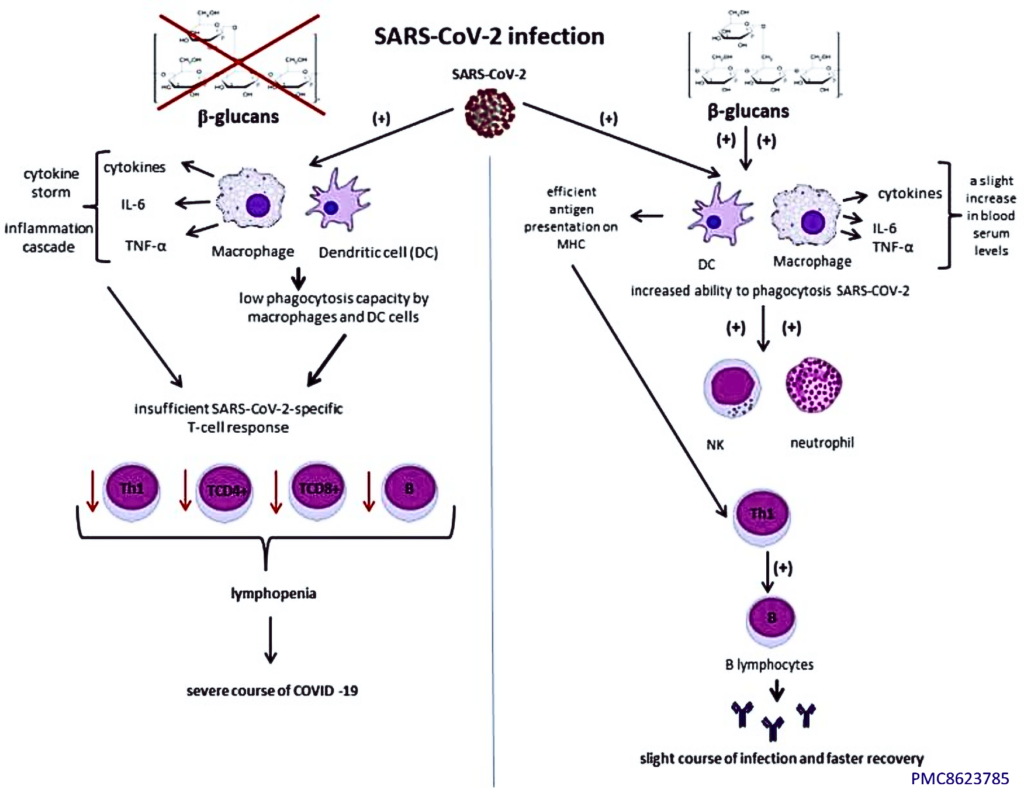
Beta-Glucan In Cancer Prevention And Treatment
Researchers have a number of theories on how, exactly, beta-glucans affect cancer. Just as in the benefits seen with beta-glucan in COVID-19, the benefits in cancer center on the immune system. They are summed up in this graphic from a recent review. [PMC7016572]
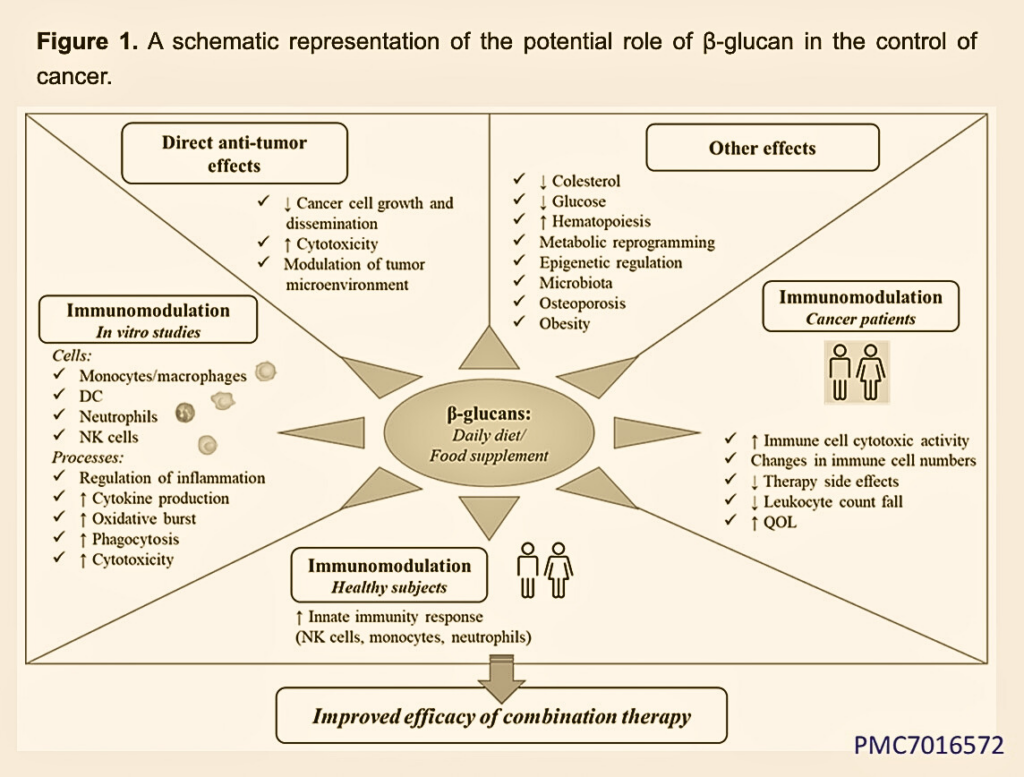
Is Beta-Glucan Safe?
Beta-glucan supplements are recognized as being very safe based on their long history of use in foods and nutritional supplements as well as countless clinical studies.
Medication Interactions with Beta-Glucan
- Blood Sugar Lowering Medications: Beta-glucan can slow down digestion, which can help control blood sugar levels. If you’re taking medication to lower blood sugar, adding beta-glucan could cause your blood sugar to go too low.
- Cholesterol Lowering Medications: Beta-glucan is known to help lower cholesterol levels. When taken in combination with cholesterol-lowering medications, it could potentially enhance the effect of these drugs, leading to overly low cholesterol levels.
Supplement Interactions with Beta-Glucan:
- Fiber Supplements: Since beta-glucan is a type of fiber, taking it with other fiber supplements could lead to an excessive intake of fiber. This might result in gastrointestinal discomfort, such as bloating, gas, or changes in bowel movements.
- Supplements That Lower Blood Sugar: Beta-glucan can slow digestion, which helps control blood sugar levels. If you’re taking other supplements known to lower blood sugar levels, like cinnamon or fenugreek, adding beta-glucan could enhance these effects.
Food Sources of Beta-Glucan
For Immune Health
Here’s a table that lists some common food sources of Beta-1,3/1,6-Glucan and the approximate amounts they contain:
| Food (1 ounce serving) | Estimated Beta-1,3 / 1,6-Glucan content |
|---|---|
| Brewer’s Yeast | ~ 5-8 grams |
| Shiitake Mushrooms | 0.4 – 0.5 grams |
| Seaweed | 0.2 – 0.3 grams |
For Blood Sugar, Cholesterol, and Gut Health
This table lists some common food sources of Beta-1,3/1,4-Glucan and the approximate amounts they contain:
| Food (1-ounce serving) | Estimated Beta-1,3 / 1,4-Glucan content |
|---|---|
| Oats | 0.4 – 0.6 grams |
| Wheat | 0.1 – 0.2 grams |
Order Beta-Glucan Supplements Online
Why Professionals Choose the Fullscript Formulary
Your health is on the line. Health professionals know that many other online and retail options set a very low bar for quality–sometimes amazingly low. The Fullscript formulary is the most secure online source for the highest quality brands securely sourced to assure freshness and purity. Here’s what makes Fullscript the best:
- Meticulous vetting of brand quality. Health professionals trust Fullscript to continuously monitor the quality of each item on the platform. Other retailers operate with profit as their highest or only motive when choosing brands. Fullscript cares only about quality and reliability. Unlike discount stores, large online marketplaces, and other retailers you won’t find ingredients sourced from China or other questionable locations or companies.
- Always 20% Discount off the manufacturer’s retail price. When you follow any link from Supplement-Sciences.com, you will automatically get 20% off the retail price.
- Free shipping over $50.
- Freshness. Fullscript prioritizes freshness over bulk buying even if it means an increased risk of briefly being out of stock.
- Top quality phone and online support. When you call, knowledgeable humans at Fullscript answer your questions.
- How It Works:
- Easy Sign-up & No Spam Email: Click the “View Product” button below to be taken to Fullscript’s login page where you can quickly create your secure account with just your name, email, and phone number. Then you will be taken directly to the product page.
- Wide variety of supplement options: Once you sign in to your account, you are not limited to the products listed below. You will see similar items listed at the bottom of each product page on Fullscript.
- Search For What You Want: Once inside Fullscript, you can search for the exact brands and products you want from their wide selection of quality brands.
Beta-Glucan by Professional Formulas
This product is an insoluble form of Beta-glucan.
Suggested Use: As a nutritional supplement, take 1-2 capsules three times daily 30 minutes before meals, or as directed by your healthcare professional.
Amount Per 2 Capsule Serving
Beta-1,3/1,6-D-Glucan … 1000mg
Brewers Yeast (Debittered) by NOW Foods
Brewers Yeast has naturally occurring protein and several B-Vitamins. It is produced by cultivation of Saccharomyces cerevisiae on malted barley in the production of beer. After fermentation, the yeast is separated from the beer, roller dried and debittered.
Take 2 tablespoons daily mixed in milk, cereal or juice. Also add to cooking and baking recipes to boost nutritional content.
Amount Per 2 Tablespoon (16g) Serving
Calories … 60
Total Carbohydrate … 7g
Dietary Fiber … 3g
Calcium 4%
Iron 4%
Food First!
Although this article discusses supplements in detail, don’t forget that we are absolutely committed to the “Food First” approach to nutrition. When it comes to your health, the totality of your eating habits far surpasses the impact of individual nutrients or any single supplement you consume. Even though this article doesn’t delve into the broader picture of your overall diet, it’s crucial to keep this element at the forefront of our minds. Your food needs to provide all the vitamins, minerals, fiber, and phytochemicals to nourish your body systems down to the cellular level.
Food choices, rather than supplements, are the most critical factors for a healthy gut microbiome. These trillions of tiny inhabitants in your gut affect your brain waves; they orchestrate your immune system. They possess the power to create molecules that can switch genes on or off and are even capable of synthesizing neurotransmitters. Opting for organic foods and steering clear of plastic packaging (including those labeled BPA-free) is a smart move to limit toxin exposure. The sum of all these parts leads to a powerful conclusion: the ultimate key to your health lies in the quality and balance of the food you consume. Supplements are secondary.
To Sum It Up
Beta-glucan is a natural compound with considerable potential to positively impact our health. This powerful polysaccharide, found in a variety of natural sources, has been widely studied for its ability to enhance immune response, manage cholesterol levels, and even exhibit potential anti-cancer properties.
This Article is Not a Substitute for Medical Advice
Dietary supplements are not designed to diagnose, treat, cure, or prevent any disease. The Supplement Sciences website seeks to provide comprehensive access to the most relevant supplement information along with convenient online ordering. We do not provide medical advice and cannot guarantee that every product suggested is completely without risk. Since each person is unique in their health history and medication use, it is important to discuss supplements with your personal physician. Specifically, pregnant women and individuals being treated for cancer or liver or kidney problems must consult their physician about every nutritional supplement they plan to take. People taking medications for the treatment of HIV or with a history of organ transplant must not take supplements without consulting with their physician.

 Scan Me!
Scan Me!
